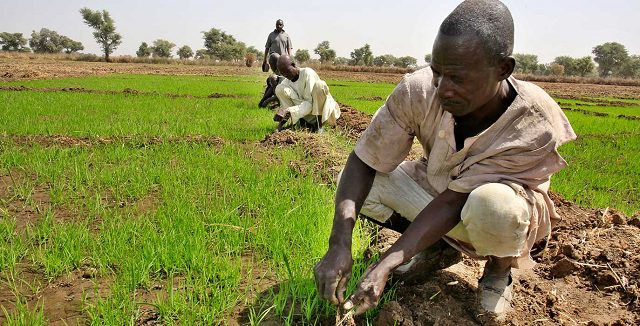The Central Bank of Nigeria says 1,059,604 smallholder farmers have benefitted from the Anchor Borrowers Programme.
The Anchor Borrowers Programme, which was launched in November 2015, was designed to build partnerships between smallholder farmers and reliable large-scale agro-processors, with a view to increasing agricultural output, while improving access to credit for farmers.
The CBN stated, “The programme has helped to bolster agricultural production by removing obstacles faced by smallholder farmers. We have also improved access to markets for farmers by facilitating greater partnership with agro-processors and industrial firms in the sourcing of raw materials.
“So far, the programme has supported more than 1,059,604 smallholder farmers across all the 36 states of Nigeria, in cultivating 16 different commodities over 1.114 million hectares of farmland. It has also supported the creation of over 2.5 million jobs across the agricultural value chain.”
Recently, while speaking on development finance intervention, the Central Bank Governor, Godwin Emefiele, said that the bank increased its lending to the agricultural and industrial sectors, through targeted intervention schemes such as the Anchor Borrowers Programme, Commercial Agricultural Credit Scheme and the Real Sector Support Facility.
“In particular, we sought to improve the domestic supply of four commodities (rice, fish, sugar, and wheat), which consume about N1.3tn annually in our nation’s import bill,” he said.
He said its targeted focus on the agricultural and industrial sectors were driven by the vast opportunities for growth in these sectors given the country’s high population.
According to him, it was also instrumental in taking Nigeria out of the recession.
Emefiele said that in 2017, over 50 per cent of the contributions to GDP growth came from the agriculture and industrial sectors.
He said these sectors had the ability to absorb the growing labour pool of eligible workers in its effort to meet the household consumption needs of the Nigerian populace.
If efforts were made to improve productivity gains in the sectors, he said it would reduce the country’s dependence on imported items that could be produced in Nigeria.
He said, “Furthermore, improved productivity in agriculture and manufacturing could also help in reducing our dependence on proceeds from crude oil.
“In 2017, Nigeria’s total revenue from exports of crude oil was $23bn, relative to Indonesia, which earned close to $22bn from the export of palm oil in 2017. Nigeria has vast amounts of arable land that can be put to good use in the cultivation of not only palm oil but also cotton, cocoa, tomatoes and rice to mention a few. Supporting growth in the agriculture and industrial sectors is critical in our efforts to create a diversified wealth base for the country.”
Source: Nigerian NewsDirect










